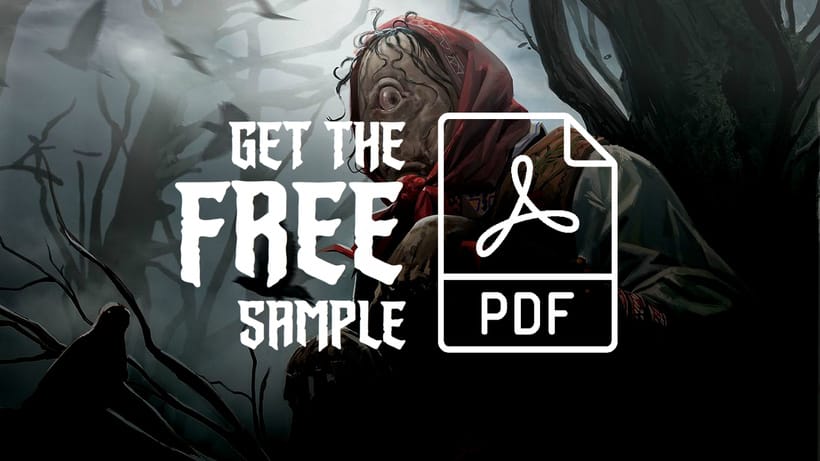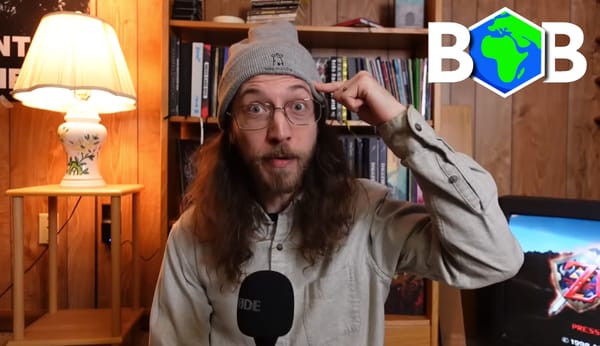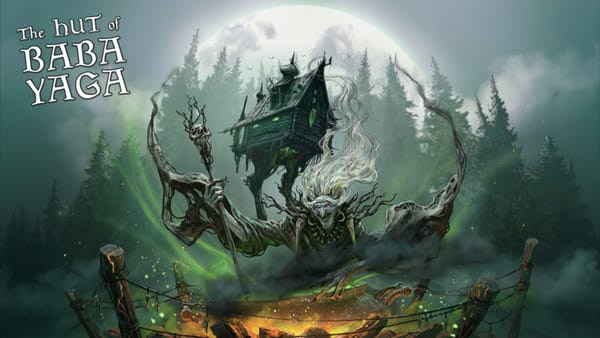Building Worlds, One Roll at a Time: The Foundry VTT Journey

When we look at the world of tabletop role-playing games today, it’s impossible to ignore the transformative impact of Foundry Virtual Tabletop. Born from a personal passion and a vision for something better, Foundry VTT emerged at a moment when online play was becoming not just a convenience, but a necessity.
Behind this revolution stands Andrew Clayton, a creator whose commitment to flexibility, community empowerment, and technical excellence reshaped what a virtual tabletop could be.
This interview offers a rare glimpse into the mindset that fueled Foundry’s journey: an unwavering belief in making tools for players, by players. Andrew’s story is not just about coding or business decisions — it’s about trusting instincts, valuing community input without being captive to it, and building something lasting without sacrificing integrity.
In a world increasingly driven by subscriptions and short-term gains, Foundry’s one-time purchase model is more than a pricing decision — it’s a philosophy. It speaks to respect for the player, for ownership, and for the creative freedom that tabletop role-playing embodies.
Reading through Andrew’s reflections, one is reminded that great things often start not with a grand business plan, but with a simple idea: “What if we made the thing we always wished existed?” Through challenges, successes, and a continually evolving industry landscape, Foundry VTT remains a beacon for creators who believe that passion, perseverance, and community are still the best ingredients for lasting impact.
This conversation invites us not only to appreciate Foundry’s success but also to dream boldly — and to build the future we want to see.
Onward!
What inspired you to create Foundry Virtual Tabletop, and what gaps did you see in existing platforms?
I have always enjoyed having side projects in the gaming space. In 2018 I was in between such projects. My own tabletop gaming had moved online several years previously due to friends living apart or gaming with new friends made playing online.
I’ve used most other VTTs you can think of – and I found myself frustrated with a few limitations of the available options. I wished for a product that had the cornerstone features that Foundry VTT now offers; self-hosted, no subscription, system agnostic, extensible API for software development.
I started dabbling with some new web technologies I was excited about, and the stars aligned to reveal a path forward to accomplish those goals!
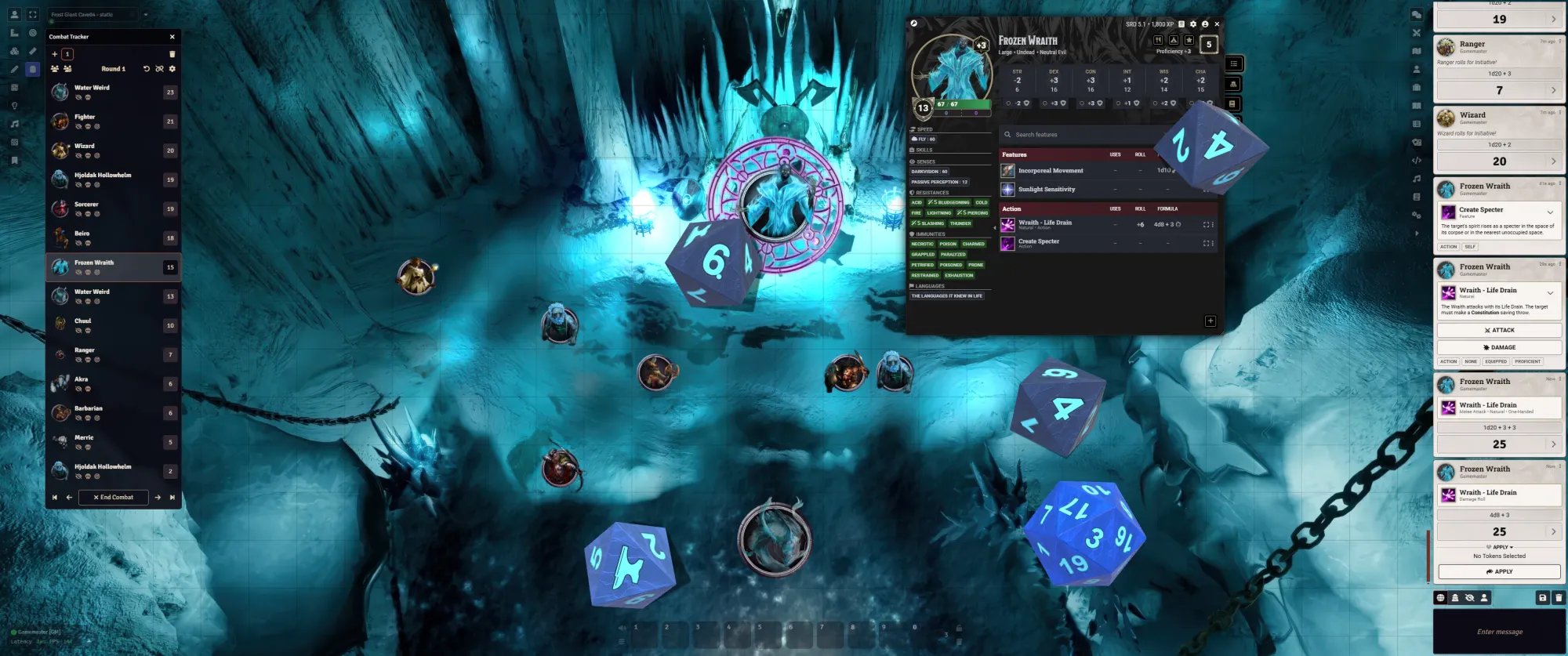
How has Foundry evolved since its launch in 2020, and what are some of the biggest improvements you've implemented?
I’m extremely proud of the amount of improvement that Foundry VTT has seen since its initial launch in 2020. The Software Releases page on our website documents each of the 159 software releases that our team has produced spanning 13 major generations of the software. Our latest iteration, version 13, is reaching a stable release right now (at the end of April).
These improvements are too numerous and significant to comment on individually, but our latest generation, version 13, is headlined by a major UI overhaul of the software, a new framework for token measurement and movement, and way more.
What challenges have you faced in developing and maintaining a platform that supports so many different TTRPG systems?
Certainly, a lot of technical challenges we face are much harder to resolve in a system-agnostic way than if we were responsible for implementing software for one system only.
For example, recently, when developing the new movement and measurement system in V13, we needed to think broadly about how “movement” works across many different games to identify a common framework that game systems can extend and customize to satisfy their own technical and mechanical requirements.
Another V13 feature which required significant thought to build in a system-agnostic way is a new Calendar system and extensible API allowing systems or modules to implement functional in-world calendars with their own timekeeping rules and structures.
Developing Foundry VTT in this way has been challenging, to be sure, but also invaluable at fostering an ecosystem with over 350 individual game systems implemented and supported.
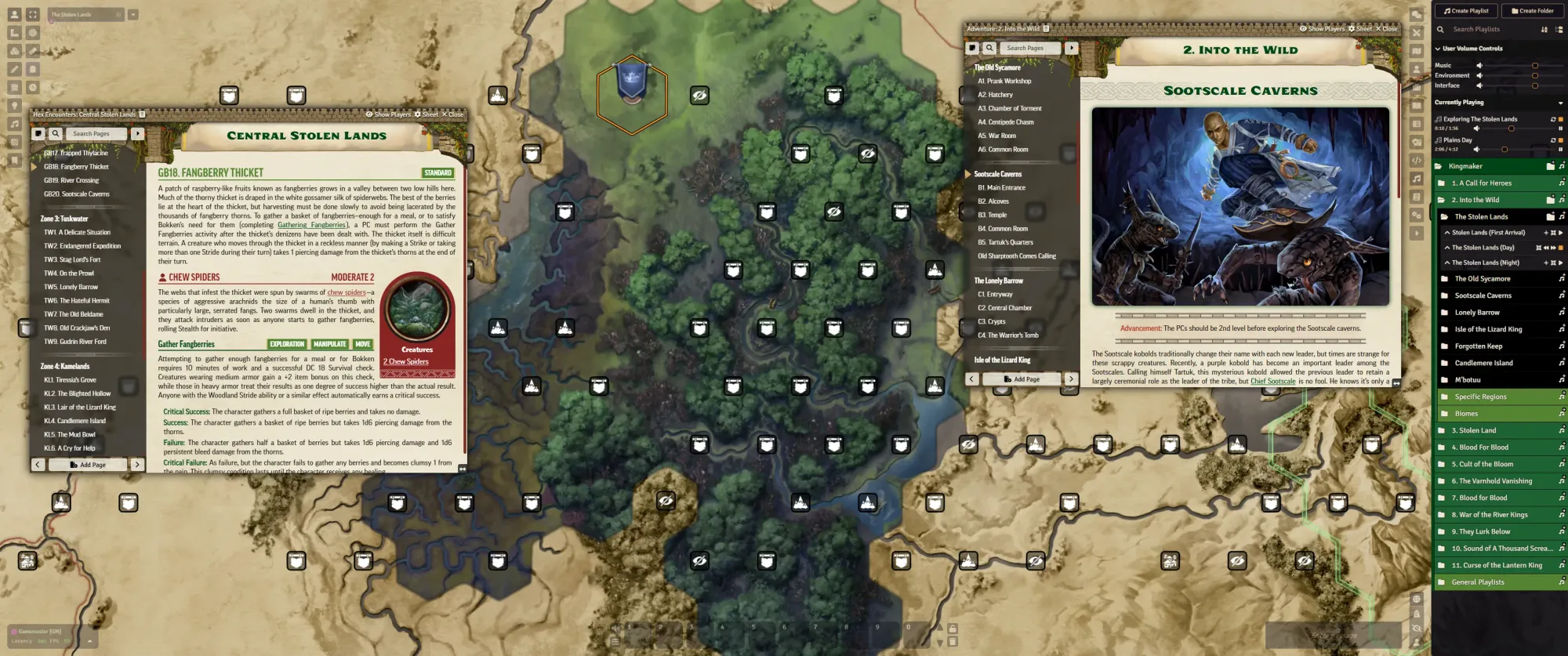
What role does community feedback play in shaping Foundry’s roadmap and updates?
Community feedback is hugely important for us, but not unilaterally important. Our team prioritizes feature development along three primary lanes: features that we internally feel are essential, features that our community feedback reveals are highly desired, and features that we believe will improve Foundry VTT for new users.
Because of our business model as a one-time purchase with a perpetual license, our revenue model relies on new user acquisition. Focusing exclusively on feedback from our existing users would only work if the preferences of new users are highly overlapping with those we already have.
Foundry has built a strong and dedicated community. What marketing strategies were key to growing your user base?
We have been lucky that our community is so devoted, this has made our marketing job far easier than if we had to incentivize and stimulate growth ourselves. We are fortunate to be able to keep our heads down and focus on making the best VTT we possibly can make.
Tabletop RPGs are inherently a social hobby, and people aren’t using our software in isolation. If we can focus on delivering a wonderful experience for someone who is running a game, there is an inherent virality of that experience that 3-5 players will have also shared that wonderful experience and will appreciate that Foundry VTT was a part of what made it happen.
We can optimize for people playing games and having great experiences during play – the marketing can then (mostly) take care of itself.
What role has social media played in the success of Foundry VTT? Which platforms have been the most effective for engagement?
To be honest, this is an improvement area for us. Our use of social media has been casual and often an afterthought. The main exception is Discord, if you count that as “social media”, where we have a wonderful and dedicated community. That’s the platform where we engage every day with our users.
How do you attract new users while keeping long-time users engaged with the platform?
I spoke about this in my earlier responses, but I don’t think we focus too much on trying to keep long-time users engaged. We aren’t a subscription service, so typical optimization metrics like renewal or churn aren’t ones we focus on. That’s not to say we don’t want to keep people using Foundry VTT, we absolutely do, but our philosophy is to just focus on always making the software better and trust that feature improvements will keep people using it more than marketing effort would.
As for attracting new users, it’s all about the community of users sharing and exposing Foundry VTT to others through discussion and played sessions.
Are there any marketing techniques or tools you wish you had used earlier in Foundry's development?
Of course, it’s possible to look back at the past – knowing what we know now – and identify things we should have done differently. The clearest areas of hindsight I have here are not related to marketing techniques though. I’m happy with the organic approach we’ve taken, and I wouldn’t change that.
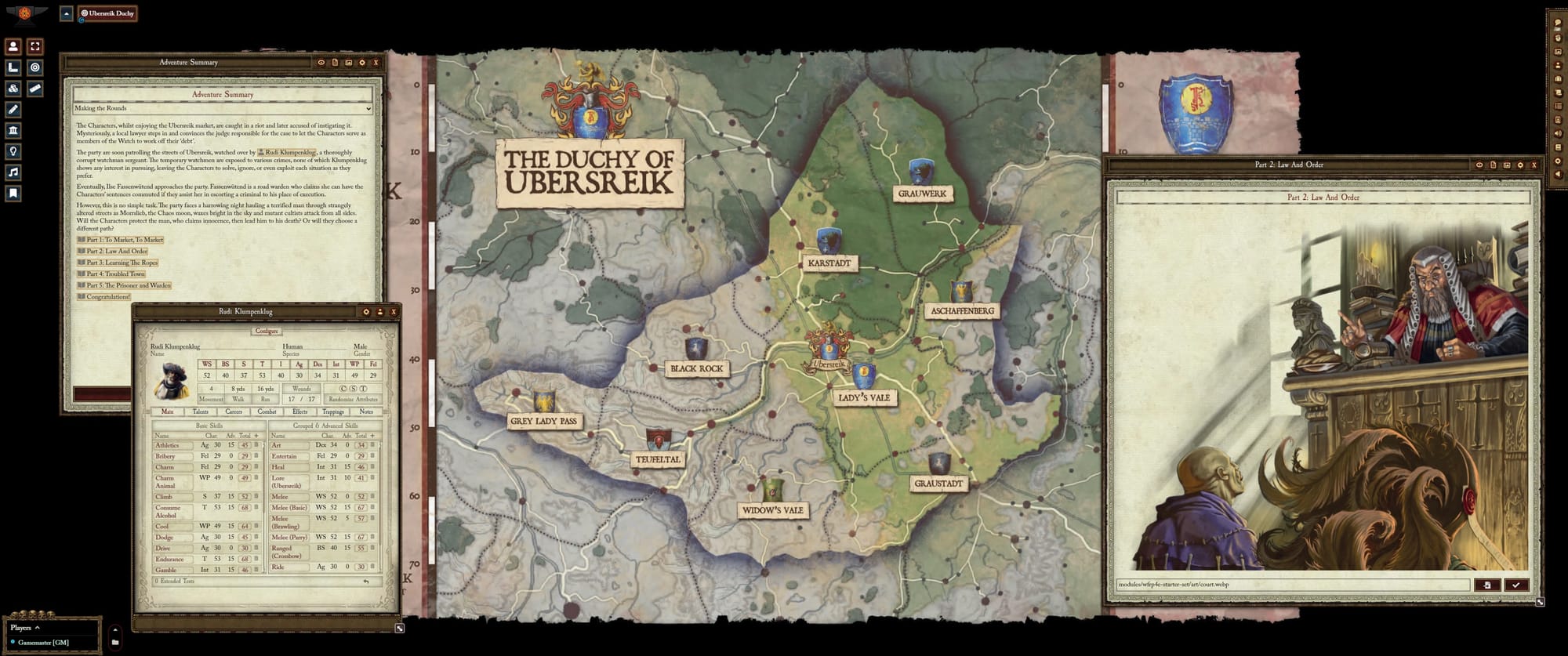
Foundry is a one-time purchase rather than a subscription model. Why did you choose this approach, and do you see it evolving in the future?
The easy answer here is I chose that model because it’s the model I wanted in a product. Most of the fundamental design decisions behind Foundry VTT are because it’s what I wanted from my own perspective as a customer.
Not only do I not see this evolving in the future, but it really cannot evolve. We have a commitment and contract with our license owners that Foundry VTT is something they own forever. We can’t (and won’t) change away from that.
How do you balance the need for monetization with maintaining Foundry as an open and community-driven platform?
My impression based on our sales data and my inspection of market dynamics is that there are a huge number of customers in the broad TTRPG community for whom Foundry VTT is an ideal product.
There may reach a point where we begin to saturate and direct sales of software licenses can no longer be our primary revenue channel – but I think we’re still a long way from that inflection point. If we do reach that tipping point, our focus will likely shift more towards content.
There are headwinds faced by traditional TTRPG physical media – most recently the ridiculous tariffs that are absolutely killing the publishers in our industry – but even more broadly I believe there will be more and more movement towards digital-first publishing with print products being treated more like a special “collector’s edition” for products.
What partnerships (e.g., Cubicle 7, Wizards of the Coast) have been the most beneficial for Foundry’s growth?
I think we’ve spoken about this before, because you are astute to name these two publishers. Cubicle7 was a hugely important partnership for us because they were one of the first “major publishers” to take a chance on Foundry VTT by offering official content for our platform.
This was only possible because of the tremendous effort of some of our community members who created the Warhammer Fantasy Roleplaying system on Foundry VTT. This was so important for us because it allowed us to show a working example of the concept that gave other publishers the confidence to follow.
Our partnership with Paizo was similarly impactful, and the importance and quality of the Pathfinder 2e system on Foundry VTT really cannot be overstated. This is also a case where the exceptional effort made by our community has empowered something to be possible that otherwise would not. There is a common theme here for most of the systems which are supported on Foundry VTT where community development opens the door for publisher partnership.
Certainly, our partnership with Wizards of the Coast is another major turning point for Foundry VTT as having official D&D content on the platform makes it even more accessible for a vast number of users.
What advice would you give to independent developers looking to create and commercialize TTRPG tools?
It’s difficult to provide only one nugget of wisdom that can apply to many situations. I think perhaps the most important general advice for aspiring creators would be don’t get into this industry if your primary motivation is income. Most TTRPG projects fail and there are only a few rare exceptions that succeed.
Absolutely throw your passion and creativity into creating something in this space if it’s something that provides you with self-fulfillment. Do it if you can afford for the possibility that your project does not generate any money. Figure out how to find other gamers who like the same things you do. Make something you love yourself and trust that there are enough other people out there who want the same things you want.
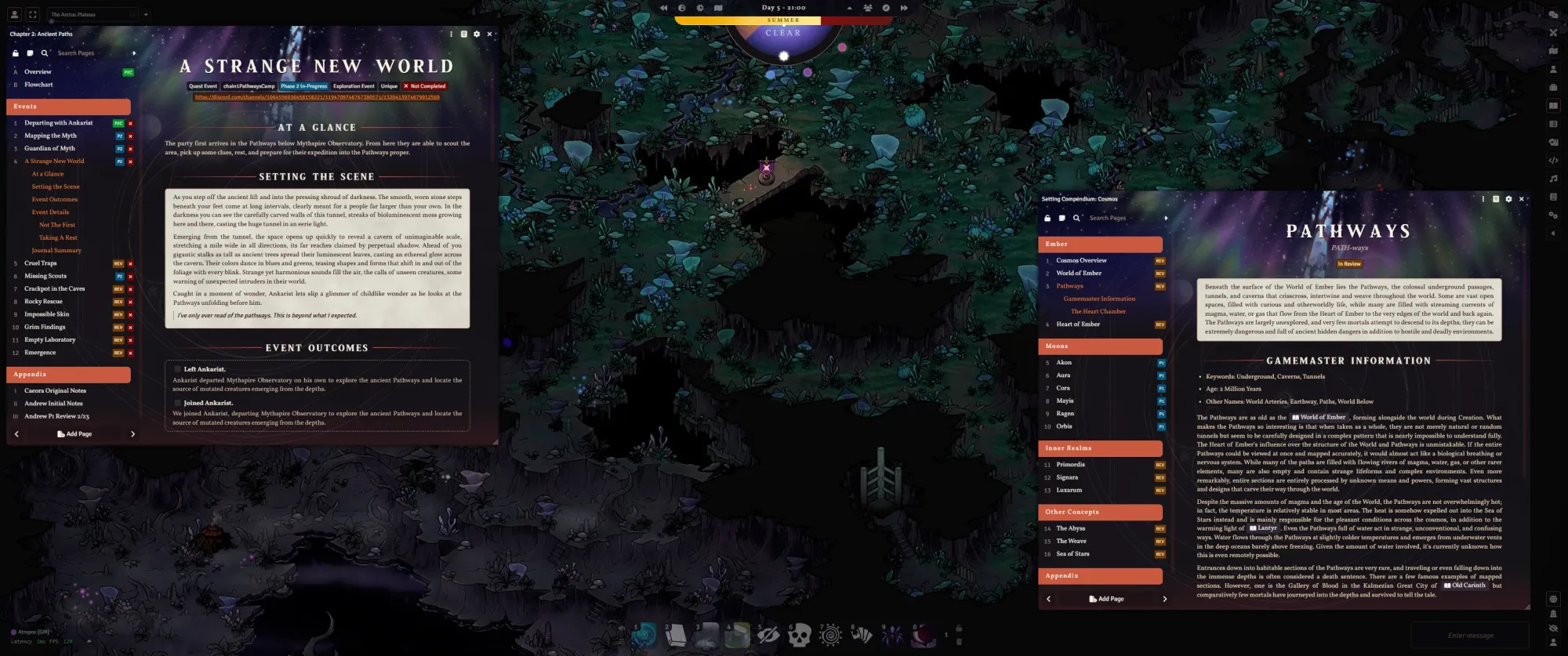
Looking back at the Ember crowdfunding campaign, which raised $710k from 3,808 backers, what were the key takeaways from the experience?
Crowdfunding is stressful and hard. It requires at least 3 times the amount of effort and time to run a Kickstarter campaign as you think it will – even if you are estimating conservatively.
What lessons have you learned from previous releases that you are applying to the Ember campaign?
Ember is a bit of a different beast. For context since many readers might not know what this is, Ember is a comprehensive digital roleplaying game which features an epic-length campaign, an original fantasy setting, and sandbox full of powerful digital tools for community creation.
If we think we can have the best VTT platform in the industry, I want us to also have the best game content and gaming experience available on that platform. Ember is a chance for us to redefine what the “top shelf” looks like when it comes to TTRPG content. We are going all-in to make something bigger and better than anything I’ve seen created in this space.
As far as “lessons learned” – we are continuing our philosophy of trusting our instincts to build something that we ourselves would love and that our community of players will react to what we’ve made in a way that shares it with their friends and allows it to grow.
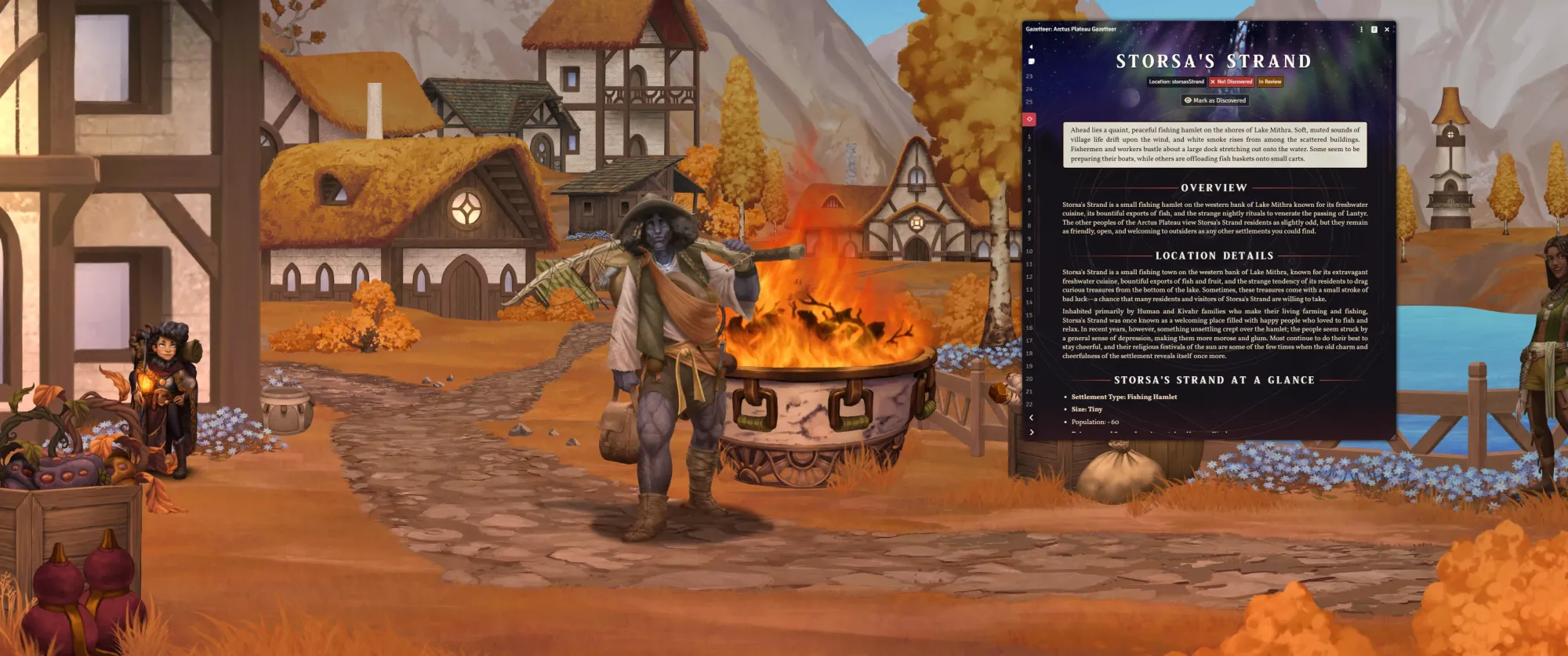
What are your biggest concerns or challenges with running a crowdfunding campaign for Foundry?
Probably the biggest challenge is that it’s impossible to truly show a potential customer what Ember is like unless they play it themselves. The nature of our software (as a self-hosted one-time purchase) makes it hard for us to provide a demo experience, so we need to figure out the right ways to convince customers to make a relatively expensive purchase (Ember is available for pre-order for $100 USD) without yet having tried it themselves.
How do you see Wizards of the Coast’s Project Sigil (D&D’s official VTT) impacting Foundry and the virtual tabletop market?
I’m going to skip over this question since Sigil is now effectively discontinued.
What do you think sets Foundry apart from competitors like Roll20, Fantasy Grounds?
The most obvious answer here is that we have a distinctive combination of business model and software features that are different than those other platforms. The less obvious answer is that our powerful technical infrastructure and open API for community development is our secret weapon that allows Foundry VTT to do more than other platforms can which are more narrowly limited to their own in-house development of game systems, premium content, or new features.
What is your stance on AI-generated content in TTRPGs, both in storytelling and virtual tools?
My own personal stance on this is that AI generated content remains – for the foreseeable future – an exploitative technology that unfairly harvests the intellectual property of artists, writers, and designers to produce soulless and derivative works without their consent.
Until the legal and ethical challenges of generative AI are more adequately addressed – and I don’t foresee this happening – I don’t think generative AI can be responsibly employed in our industry without it being a betrayal of the creative people who made the TTRPG industry what it is in the first place.
I think – in its current incarnation – generative AI content can have a role to play in private home games where generative text or images can quickly supplement the storytelling with an improvisational aid or accessibility tool, but even in this context it’s important for the user to understand it is actively disenfranchising human creators.
Do you see AI being integrated into Foundry VTT in the future? If so, in what ways?
No.
This interview is presented in partnership with Strigovia.
Strigovia is a dark, Slavic-inspired tabletop RPG where what we call “magic” is not a gift, but a debt owed to the ancient Forest — a power that listens, remembers, and always collects. There are no carefree spells or heroic fireballs here, only whispered rituals, blood-bound bargains, and slow transformations waiting for those who ask for too much.
This is low-fantasy horror focused on survival, painful choices, and stories that linger long after the dice stop rolling.
